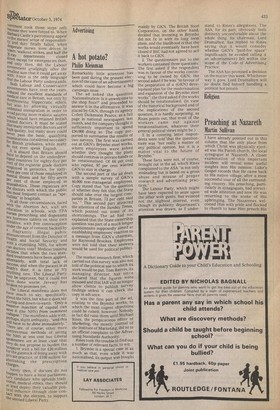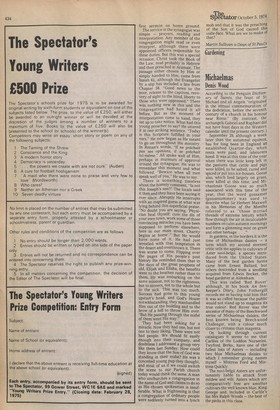Religion
Preaching at Nazareth
Martin Sullivan
I have already pointed out in this column that the only place from which Christ was physically ejected was His Parish church, the local synagogue at Nazareth. A closer examination of this important incident will reveal some useful insights into His mission. Luke's Gospel records that He came back to His native village, after a most successful tour of all the surrounding country. His preaching, particularly in synagogues, had attracted wide attention and now He was returning to the scene of His upbringing. The Nazarenes welcomed Him with pride and flocked to church to hear Him preach His
first sermon on home ground.
The service in the synagogue was simple — prayers, reading and interpretation. Any member of the congregation might read or even interpret, although there were appointed officers responsible for these duties. But this was a special occasion. Christ took the Book of the Law, read probably in Hebrew and then preached in Aramaic. The passage either chosen by Him or simply handed to Him, came from Isaiah 61, although the Evangelist by a slip has included a line from Chapter 58. "Good news to the poor, release to the captives, recovery of sight to the blind, liberty to those who were oppressed." There was nothing new in this and the congregation had heard it all before. But as the moment of interpretation came to hand, they sat up to take notice. What had this young preacher to say? He uttered it in one striking sentence. "Today is this Scripture fulfilled in your ears." He now began as He meant to go on throughout His ministry. In Renan's words, "II ne prechait PS ses opinions, il se prechait lui-meme." All spoke well of Him, perhaps in murmurs of approval around the synagogue. He was to remember this moment and what followed. "Beware when all men speak well of you," He was to say. There is something timeless about the homely comment, "Is not this Joseph's son?" The locals said it then and they have been saying it ever since. Abruptly He interrupts with an inspired guess at what was lying behind this superficial praise. "No doubt you are saying, 'Physician heal thyself: cure the ills of your own town, work some of those convincing miracles you have been supposed to perform elsewhere, here in our main street. Charity begins at home'.." But He would have none of it. He had just wrestled with that temptation in the desert and overthrown it. There was worse to come. Flipping over the pages of His people's past history He reminded them that in the days of the great prophets of old, Elijah anJ Elisha, the benefits went to the heathen rather than to them. He was embarking on the same mission, not to the righteous, but to sinners, not to the whole but to the sick. This was too much. Success had gone to this young upstart's head, and God's House notwithstanding, they manhandled Him out of the building and to the brow of a hill to throw Him over. "But He passing through the midst of them went His way."
They had been asking for a miracle. Now they had one, but not one to their liking. These were not bad people. We .should fit easily enough into their company, and doubtless I addressed a group very like them last Sunday. How could they know that the Son of God was standing in their midst? He was a conceited young pup they thought, and most of us if we could switch the scene to our Parish church today would think the same. A man who unchurches a congregation in the name of God and claims to do so as His chosen spokesman is insufferable. What is frightening is that a congregation of ordinary people were suddenly turned into a lynch -opecta-Lor October 5. 1974
mob and that it was the preaching of the Son of God caused this volte-face. What are we to make of that?
Martin Sullivan is Dean of St Pouf's

































 Previous page
Previous page